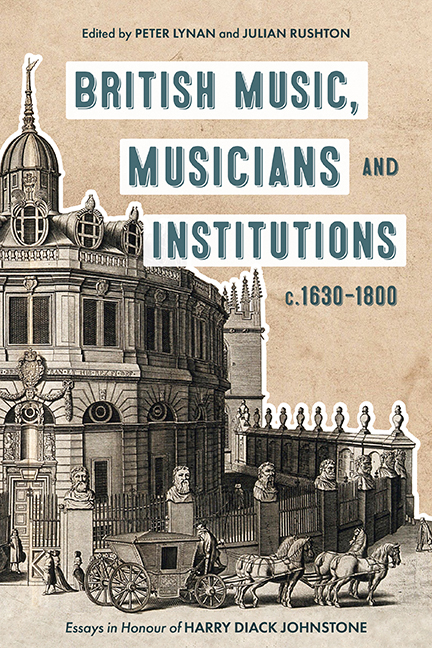Book contents
- Frontmatter
- Contents
- List of Illustrations
- List of Music Examples
- List of Contributors
- Acknowledgements
- List of Abbreviations
- Note to the Reader
- Introduction
- Part I Performers and Performance Style
- Part II Composers and Secular Institutions
- Part III Sacred Music and Institutions
- Part IV Dissemination: Copying, Printing, and Publishing
- Epilogue: Musica Britannica and the Eighteenth Century
- Harry Diack Johnstone: A Tribute
- Bibliography of the Publications of Harry Diack Johnstone
- Index
- Tabula Gratulatoria
Introduction
Published online by Cambridge University Press: 06 October 2022
- Frontmatter
- Contents
- List of Illustrations
- List of Music Examples
- List of Contributors
- Acknowledgements
- List of Abbreviations
- Note to the Reader
- Introduction
- Part I Performers and Performance Style
- Part II Composers and Secular Institutions
- Part III Sacred Music and Institutions
- Part IV Dissemination: Copying, Printing, and Publishing
- Epilogue: Musica Britannica and the Eighteenth Century
- Harry Diack Johnstone: A Tribute
- Bibliography of the Publications of Harry Diack Johnstone
- Index
- Tabula Gratulatoria
Summary
The work of Harry Diack Johnstone has changed the landscape of studies in seventeenth-and eighteenth-century British music. This volume of essays on topics picked from within that period is a tribute by friends, colleagues, and former students, with an epilogue that reflects Harry's long tenure of a job no less demanding than his university career and personal research, that of General Editor of Musica Britannica. Our tribute is not a history; at least for the eighteenth century, Harry Johnstone has already supplied one. As is normal for a Festschrift, the pickings from the landscape he has done so much to illuminate are focused on areas of particular interest to our contributors, who shed light from many angles on the production, performance, and publication of music.
Our title includes the word ‘institutions’, for which we have in mind a wider definition than might seem obvious. ‘Institutions’ might embrace, among other things, musical societies, theatres, educational institutions, and religious institutions: the kinds of organizations and bricks and mortar establishments that most immediately come to mind. But our more inclusive understanding of the term also covers the less tangible, though no less important, associations that helped to underpin musical life (professional and amateur) such as patronage, trade, private education (including the institution of the ‘grand tour’), and families. All these can be said to have, within the social structures of the time, an institutional aspect if one considers the traditions and extensive supporting networks that enabled them to become such a powerful force in musical society.
Musicians, perhaps more in the past than now, needed institutional affiliation of some sort to pay the rent and feed their families, even when it did not amount to formal employment. London was the capital of a trading nation with a good deal of wealth in private, but not necessarily aristocratic, hands, but it was not alone in allowing space for self-employed musicians whose connection to established institutions – church, court, theatre – was sporadic. However, in a less tightly defined sense, the community of freelance artists forms a kind of institution within society, and receives due recognition here. It is hardly news that many musicians working in London came from abroad. Most of these, and native musicians, were both composers and performers; they were often related, so the institution of the family also finds its place, in which sons (it was usually sons) followed their father's profession.
- Type
- Chapter
- Information
- British Music, Musicians and Institutions, c. 1630-1800Essays in Honour of Harry Diack Johnstone, pp. 1 - 6Publisher: Boydell & BrewerPrint publication year: 2022

